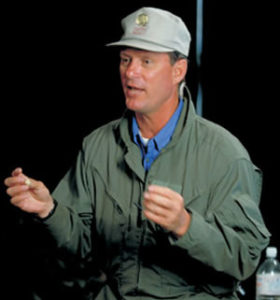
Bob Ballard, the explorer best known for the discovery of the Titanic and other wrecks, has not only made deep-sea exploration more accessible for K-12 and college students, but he’ll feed them updates through two of their favorite web sites: Facebook and Twitter.
Ballard visited the Mystic Aquarium and Institute for Exploration in Connecticut June 23 to introduce his new Nautilus Live Theater, along with a new web site where people can watch his expeditions live.
“The idea is to have millions of people follow these expeditions,” said Peter Glankoff, the aquarium’s senior vice president of marketing and public affairs.
Visitors to the aquarium will be able to attend four daily presentations in which they will not only learn about Ballard’s latest expedition but will be able to watch it live on a huge high-definition screen as well.
They will also be able to talk to the scientists and engineers aboard the Okeanos Explorer and Nautilus, the two ships Ballard will be using in the Black and Aegean seas and the Pacific Ocean this summer to explore, among other things, ancient wrecks that could contain the mummified remains of 2,000-year-old sailors and a massive underwater volcano where marine life lives in boiling water.
At some point, aquarium visitors will also be able to help pilot remotely operated underwater vehicles the ships use to explore — even though they will be thousands of miles away.
The initiative has an even greater reach: Ballard has launched Nautilus Live, a web site that allows people to not only learn about the expeditions but watch them live and listen to the scientists in the control rooms as the discoveries are made.
With the help of 20 cameras aboard the ships and on the ROVs, those logging on will see and hear exactly what the scientists are seeing and hearing, 24 hours a day.
And just to make sure people don’t miss anything, Facebook and Twitter will send out alerts if it appears the teams are closing in on an important discovery. This will allow them to get to their computers and be there when it happens.
“We’ll never have a dull moment,” Ballard said Wednesday. “We’ll always be doing something. The idea is to constantly go with the action.”
Ballard detailed the Nautilus Live Theater’s evolution at the Texas Computer Education Association (TCEA) conference in Austin last year before a crowd of several thousand educators.
If a submarine reveals a major discovery–say, a lost city, such as the legendary Atlantis–experts in whatever scientific fields are relevant can be at their respective command centers within 20 minutes, remotely controlling the sub and its cameras to zoom in on particular features as they explore this latest breakthrough, Ballard said.
“I tell kids in middle school that their generation, thanks to telepresence technology, will explore more of the Earth than we’ve [ever] previously explored,” he said at TCEA.
The theater and web site are the culmination of a dream that began taking shape in 1982, when National Geographic magazine asked Ballard to describe the future of ocean exploration.
The magazine published a drawing in which remotely operated vehicles tethered to a surface ship would explore the ocean bottom and beam video to scientists and students from around the world.
This would allow them to participate in the discoveries in real time, even though they were thousands of miles away. And it would allow scientists to explore much more of the ocean than they could in tiny, manned submarines.
When he first relocated to the aquarium in the mid-1990s, Ballard said that someday he would like to be able to oversee his expedition from his home and have people be able to explore the Titanic from the comfort of their own living rooms.
The technology did not exist at the time, and Ballard and his team have spent the past three decades developing the systems needed to make it a reality. Over the past several years, he has tested them during his annual expeditions.
“Surprisingly, this has all worked. I’ll be damned,” Ballard jokes.
In December, Ballard began broadcasting from the ships to Boys and Girls Clubs, schools and other institutions via his Immersion Learning web site, using his new Inner Space Center at the University of Rhode Island as a command post.
Teachers from across the country who will be working aboard the ships as embedded reporters will be part of broadcasts back to more than 80 Boys and Girls Clubs and science centers.
The Inner Space Center is linked to scientists, archeologists and other experts across the country who are on call in case a discovery is made and their expertise is needed. They can then report to one of 12 institutions and participate in the expedition remotely.
“We now have the technology to show these expeditions live so you don’t have to wait until we come back to read about them,” Ballard said.
As it’s been with his JASON project and Immersion Learning, Ballard’s latest effort is also designed to interest students in science and engineering careers.
Ballard described it as taking advantage of a “wow” moment — when a student’s jaw drops when he or she sees something exciting.
“That’s when we can put a lot of information into them,” Ballard said.
- Research: Social media has negative impact on academic performance - April 2, 2020
- Number 1: Social media has negative impact on academic performance - December 31, 2014
- 6 reasons campus networks must change - September 30, 2014

